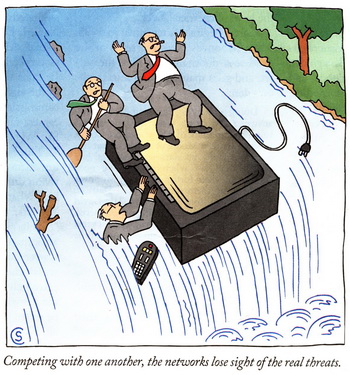Has Network TV lost so much of its audience during the past decade (or two) because it can’t show nudity? Because it only grudgingly and inconsistently allows “strong” language? Because it doesn’t dare to attempt to cover really deep, raw, gritty story subjects.
Part of the problem stems from the above reasons. But ALL of the reason boils down to the reliance on commercial sponsors.
Since the dawn of TV, the sponsors have owned the programming and — as a result — the networks. None of the major networks will dare to cross the advertisers.
How about the FCC? No — networks challenge the FCC all the time. Sometimes they have to pay fines. But they seem to be OK with that.
The biggest problem is satisfying the advertisers that there will be people watching the programs that a Network puts on the air.
And not just any people — the RIGHT people.
Dividing the audience by sex, income level, age and other factors is called “demographics.” TV
Networks worry about supplying the advertisers with the most desirable demographics.
If a program attracts “the wrong element” then it won’t last long.
The newest case in point is “Harry’s Law” — a popular and award-winning program starring an Oscar winning star (Kathy Bates: Misery) and a producer who has delivered numerous hits over the years (David E. Kelley: Chicago Hope, Ally McBeal).
Yet, even though “Harry’s Law” was either the most or second-most watched network TV program (that wasn’t a reality show) for the past two years, it was canned by the network.
Why?
Because it was “unmanageably older-skewing” (TV Speak meaning the viewers were 55-years or older).
The marketing geniuses at the advertising agencies feel that the 18-34 and 18-49 year old audience is where the gold is.
Even the 25-54 demographic group acceptable.
By acceptable, this means that people in these age groups spend the most money. They are the chief consumers in society.
But society is not a snapshot. It is a movie. It is dynamic, flowing and changing.
The Baby Boomers have driven marketing since the post-World-War-II era. When a glut of babies were born, Americans bought more baby goods — diapers, baby food, formula, baby clothes, toys, etc.
Then the “boomers” became “youth.” The products in demand for them were not only clothing and amusements (like movies and comic books), but television started creeping into more and more homes in the 50s and 60s. Programming for children was an important part of the schedule — although the majority of programming was for Mom and Dad who were buying appliances and cars and household goods.
But in a few years, the “boomers” became car buyers, and home buyers and started raising their own children.
Somehow, subsequent generations didn’t reproduce as much and the Baby Boom was followed by a decrease in young people — a shift in demographics from young people spending all the money to older people spending the money.
Leave it to the advertisers and broadcasters to avoid changing because of fear.
If 18-49 year olds drove the market in the 60s and 70s, then why change in the 80s and 90s?
But the audience did change. As they aged, the most important sector of the economy was real estate and financial instruments (insurance, stocks and bonds, etc). Johnny Carson and Ed Sullivan gave way to Saturday Night Live and MTV. Network news became outdated by the time it was on the air because of continual internet updates and non-network 24-hour news channels.
By the time “Harry’s Law” hit the airwaves, all the network shows featured thin, beautiful and racially-diverse young people — Friends, Seinfeld, Beverly Hills 90120.
The older people were served by shows like Matlock and Murder She Wrote. And yet, even though they had a huge following, the demographics “skewed old.”
The networks cancelled them and viewers shifted to cable, satellite and internet programs. Total audiences for network shows declined
In 2010, the audience for network news programs continued its quarter-century decline.
As long as networks serve the advertisers instead of paying attention to what their audience want, it will be difficult to hang onto quality programming.
Kathy Bates recently told Entertainment Weekly:
“It really bugs the crap out of me when I read online that this is the lowest-rated show on NBC, ’cause all they’re talking about is the demo. They totally disregard the number of viewers. And, you know, as somebody who’s 63 years old, I really take offense at that because we do have an audience of older viewers, I think, for the most part.”
”We do have a real faithful following, and I wish they’d just shut up about the GD demo. I mean, who cares?” she says. “It’s just like, we really are the highest scripted show on NBC. I mean, that’s been our status since we went on the air.”
POOF! Then they are gone.

Leave a Comment